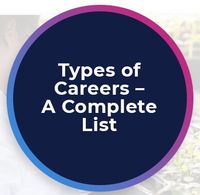Career fields: an overview
Most of you are getting close to graduating, meaning that you will soon enter the job market. This process can be quite overwhelming as there are many options, some of which you may not even be aware of yet. To give you a starting point, you can find an overview of what most of the fields you could enter after graduation generally entail and which skills are most suitable for this. The jobs described in this article are: academic and industry technician, PhD, industry scientist, consultancy, data analyst, entrepreneurship, junior lecturer, patent officer, project manager, quality assurance officer, quality control officer, recruiter, sales and science communicator.
(Academic) research
Academic technician
For this position, either a BSc or a MSc degree is required. When applying, it is important to list your prior research experience. You need to have excellent oral and written communication skills and good organisational and time-management abilities. It is important to have a team centred and collaborative mindset as well as problem solving and troubleshooting skills.
Industry technician
For this position, a MSc degree is preferred and a PhD will often make you overqualified. You should be motivated, have relevant knowledge or working experience. You should be precise and accurate in data interpretation. Of great value is being able to deal with changing priorities, unexpected workload and tight deadlines. It is important that you enjoy running multiple projects simultaneously and working in a team.
Doctor of Philosophy (PhD)
When searching for a new PhD student, the lab will often look for personal suitability within their team. In addition, they will often ask for prior experience with certain techniques. In order to do a PhD (in the Netherlands), a MSc degree is required. It is a plus if you have good knowledge of statistical data analysis and experience in building or managing databases. Skills that are good to have as a potential PhD candidate include, but are not limited to, excellent oral and written communication skills, being autonomous but also function well in a team, strong analytical, critical thinking and problem-solving abilities. Furthermore, it is important to have a good command of English. Most important, however, is that you have a deep interest in the field and a strong motivation to pursue a career in research.
Industry scientist
The requirements for an industry scientist are that you have either obtained a MSc degree or a PhD in a related field to the position you are applying for. You are often required to have prior knowledge or experience with certain techniques and have a history of scientific excellence. It is important that you personally thrive in a fast-paced working environment and that you enjoy translating scientific concepts into practical solutions. You should be able to work both independently as well as in a team-oriented environment. Other skills that are of great value to an industry scientist are strong record-keeping skills, excellent interpersonal, written and verbal skills, strong critical thinking and problem-solving abilities and taking initiative.
Consultancy
There are many different types of consultants so here a general overview of potential tasks of a consultant will be given. A generally important aspect of any type of consultancy is to deliver insights and recommendations to clients. As a consultant, you typically work on two to three projects simultaneously. You will utilize your academic skills by generating project questions and studying the literature in order to deliver the best findings in the most relevant way to meet the client’s needs. In order to do so, you might need to conduct interviews with various stakeholders and experts. In addition to this, you will write reports, make slide decks and give presentations. As a consultant you will often work in international and interdisciplinary teams.
For the application process, it can be beneficial to have prior knowledge of consulting methodologies, tools and techniques. Consultancy companies are often looking for candidates with a MSc degree. Excellent written and verbal communication skills are required and strong analytical, organizational and problem-solving abilities are desired. It is important to enjoy working in a fast-paced environment. Last but not least, you need to be able to manage multiple tasks at once.
Data analyst
As a data analyst, you are responsible for the integrity and accuracy of master data and continuously improving data quality by addressing performance issues. You might develop, maintain or grow software toolboxes needed to perform data extraction and analyses. Besides this, you might develop dashboards or integrate new key performance indicators (KPI’s) into existing reports. A central task in all of this is clearly communicating with stakeholders in order to solve issues and to ensure that your actions align with their wishes.
You can start with a position as a data analyst with a BSc degree and relevant work experience or a MSc degree in a relevant field. There are many experiences that can be an asset when applying for a data analyst position, which include: demonstrable experience in processing data or programming, affinity with software engineering, knowledge of machine learning or modeling and familiarity with operating large datasets. Good communication skills are essential, as is the ability to empathize with stakeholders and step into the mind of a customer. You should be able to break down a large problem into manageable components and excel at problem solving. It is important that you function well in a team, are proactive and have an open and ambitious attitude.
Entrepreneurship
Being an entrepreneur can mean many different things and therefore almost any skill is valuable for entrepreneurship, depending on your role. Some examples of overarching categories of skills can be creative thinking, leadership, risk-taking and a strong work ethic.
(Junior) lecturer
The exact job description for a junior lecturer varies depending on the position. You can, for example, be involved in tutorial groups in academic and research skills. You can have a role as a tutor for first year students, assist with assessments and/or support the coordination of courses. Furthermore, as a junior lecturer you can help with improving the quality of education.
As a junior lecturer, it is important that you can be autonomous, like to take initiative and have excellent communication skills. Of great value to have are good didactical, organizational, verbal and written skills, a team spirit and the ability to inspire students. For this position, a MSc degree or PhD in a related field is required.
Patent officer
A patent officer’s responsibility is to work on the administrative process of national, international and priority patent procedures. You often work on this together with a team of colleagues. During the process, you often have meetings with patent offices, law firms and inventors. Examples of tasks of a patent officer are filings, managing a patent docket, organizing patent review meetings and managing the patent portfolio. You will have to navigate through a complex environment with multiple stakeholders.
The minimum requirement for a patent officer is that you have obtained a BSc degree. You have to be able to manage tight deadlines, work in a structured way and focus on accuracy and data reliability. It is important that you are detail-oriented, work well in a team, are flexible and can handle multiple priorities simultaneously. Of great value are excellent communication, written and verbal skills, a proactive attitude in both execution and thinking.
Project manager
Within the scientific field, there are several types of project managers such as a clinical research project manager and a scientific project manager. As a project manager, you coordinate and oversee daily operations. You keep track of project progress and milestones, address potential deficiencies and communicate these to the stakeholders. It is your responsibility to ensure that a project is of high quality, finishes on time and stays within budget.
As a project manager, you should be able to facilitate discussions between stakeholders with diverse interests to eventually lead the group to a consensus. This requires stellar communication skills, adaptability and strong attention to detail. Companies are often looking for candidates with strong analytical and critical thinking skills, good time management and organization skills and who are good at networking and managing professional relationships. Usually, a MSc degree is required and sometimes you can also apply for a position as project manager if you have a PhD.
Quality Assurance officer
As a quality assurance officer, you are responsible for the detection and resolution of problems (early in development) of the manufacturing process. You develop and improve the standards of operation. You keep reports to record and track issues and to document all quality assurance activities. One of the most important aspects is maintaining customer satisfaction while staying on budget and meeting deadlines.
The job description of a Quality Assurance Officer varies depending on the industry, but detail-oriented, analytical, problem-solving professionals with excellent written, verbal and collaboration communication skills are often desired. The minimum requirement for a quality assurance officer is that you have obtained a BSc degree in a relevant field.
Quality Control officer
A quality control officer’s main responsibility is to assess the end product’s quality to ensure that it meets the quality requirements. You are monitoring operations, which might include approving production processes and specifications as well as conducting measurement tests to provide sufficient information to set the standards for production. In addition to this, you are required to update the management and your senior and report to them about any required changes in the production processes.
This job is well suited for people with an eye for detail, excellent verbal and written communication skills and good organizational skills. Other skills that are of great value to have is the ability to work as part of a team and enthusiasm to motivate your colleagues. Companies often require a quality control officer to have at least obtained a BSc degree in a relevant field.
Recruiter
Translating the wishes and preferences of a client to shape the recruitment and selection of new talent will be central in your role as a recruiter. You have to be aware of the state of the labor market and the latest developments. During the interviews, you pinpoint the technical skills and personal abilities of potential candidates. In addition, you might be responsible for guiding and advising candidates during the application process. An example of a company with scientific recruiters is Science@Work.
When applying for a job as a recruiter, it can be a plus if you have been on a committee or had a part-time job during your studies as it can show that you have an enterprising spirit. In addition, commercial experience or experience in the service can be a plus. It can vary per vacancy whether a BSc or MSc degree is required. The job is well suited for people who have a well-developed social judgment and who excel at asking sharp questions. Of great value to have are excellent communication and written skills, a passion for networking and giving advice and working accurately and keeping an overview.
Sales
Sales representatives in the scientific field (e.g. at Merck, MSD, Eppendorf, ThermoFisher or Johnson & Johnson) can be responsible for the sales of research products and services in a defined research area. You maintain customer relations while also developing opportunities for growth of the current customer base. Next to this, you should collaborate and communicate effectively with your colleagues on the customer team and your manager.
Qualifications for Sales Representatives include good negotiation skills, excellent interpersonal, listening, communication and presentation skills. A sales representative should be highly organized and efficient. It is important that you thrive in an execution role where getting things done also drives your personal motivation. An additional requirement could be a high degree of flexibility and willingness to travel out of town for meetings. In order to apply for a position as a sales representative, at least a BSc degree preferably in a related field is required.
Science communicator
The main goal of a science communicator is to increase the public engagement in science-related topics by making scientific developments more accessible to the general public.
Science communication is well suited for you if you have the ability to communicate complex ideas in an engaging and accessible way and if you are good at building a network and communicating with people at different levels. You should be driven, proactive, creative and have knowledge of and passion for science. Furthermore, it is important that you know how to deal with deadlines. Finally, most companies search for applications with a MSc degree.
As you can see, not all jobs require a PhD even though it can open some extra doors. Don’t forget that employers are also just looking for someone who fits in their team and who contributes to a pleasing working environment. You usually don’t need to perfectly fit all their requirements as enthusiasm, passion and curiosity can really make up for that. We hope this concise overview of quite a number of fields will give you an idea of which field(s) suits you best!


